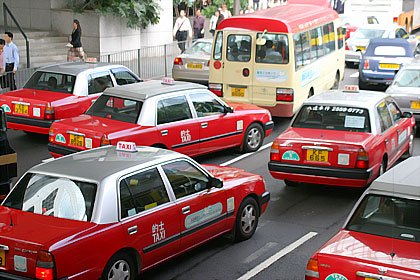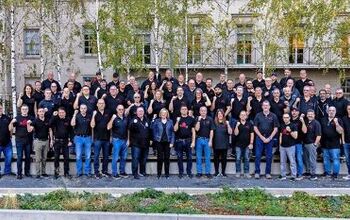Hong Kong Battles Strange Ghosts In A Bottle

While the world is trying to come to grips with pedal-gate, tiny Hong Kong is attempting an exorcism of its own gremlins: 18,000 (mostly Toyota Crown) taxis and 2,000 minibuses are propelled by LPG, liquefied petroleum gas. The gas is lugged around in a large tank housed in the trunk of the taxis, much to the chagrin of suitcase-schlepping tourists. The real problem is: The LPG mobiles are breaking down in wholesale fashion, China Daily reports. Hundreds a month.
The Hong Kong government set up a special task force to investigate. Nobody is blaming Toyota – this time.
Enraged taxi drivers point fingers at Sinopec, the mostly state-owned Chinese energy giant, which owns seven of the 12 dedicated LPG stations in Hong Kong. The drivers say, the Chinese gas is contaminated. The drivers boycotted Sinopec. The rivaling stations promptly ran out of gas.
Sinopec did react no different than car companies that are faced with unexplained ghosts. Sinopec pointed their fingers right back at the drivers and said they don’t maintain their vehicles properly.
Sinopec did their own testing of the gas, and found no problems. In the meantime, the Hong Kong government took samples and sent them to an independent laboratory in Germany for testing. Final results will be announced next week.

Bertel Schmitt comes back to journalism after taking a 35 year break in advertising and marketing. He ran and owned advertising agencies in Duesseldorf, Germany, and New York City. Volkswagen A.G. was Bertel's most important corporate account. Schmitt's advertising and marketing career touched many corners of the industry with a special focus on automotive products and services. Since 2004, he lives in Japan and China with his wife <a href="http://www.tomokoandbertel.com"> Tomoko </a>. Bertel Schmitt is a founding board member of the <a href="http://www.offshoresuperseries.com"> Offshore Super Series </a>, an American offshore powerboat racing organization. He is co-owner of the racing team Typhoon.
More by Bertel Schmitt


































Comments
Join the conversation
It shouldn't be a pain to load luggage in an LPG equipped taxi if they opt for the toroidal tank that fits in the spare tire well... which is cavernous on a late 80's / early 90's design like the Toyota Crown. Of course, most taxi drivers are cheapskates and opt for the cylindrical tank, which takes up more space than a quartet of subwoofers. I wonder what kind of breakdown it is? If the fuel system is gumming up, then that could be Sinopec's fault. If it's engine failures... then it's not contaminated fuel so much as either substandard fuel or poor tuning.
That is a curious; the problems related to slow burn rate of propane causing valve and valve seat wear have been largely solved since the advent of unleaded gasoline. Without knowing what the breakdowns actually are its hard to say what the culprit could be. Using LP for a fleet is a brilliant move in regards to emissions, in increasing longevity of the engine and increasing service intervals and so reducing maintenance costs.
Improperly graded propane with high propylene levels create all sorts of problems with internal combustion engines. US and Canadian regulations call for HD5 in commercial applications. HD5 contains 5% or less propylene and other contaminates. HD10 contains greater than 5% and will cause fuel system pressure regulators and carburetors to gum up quickly. Heavy deposits are left in the propane fuel tank as well. A supplier, if by accident, providing HD10 could create a large scale situation similar to what is occurring in Hong Kong. It will be of interest to her what the German's find in their testing.
Why can't the taxi drivers just put a big basket on the roof for luggage?